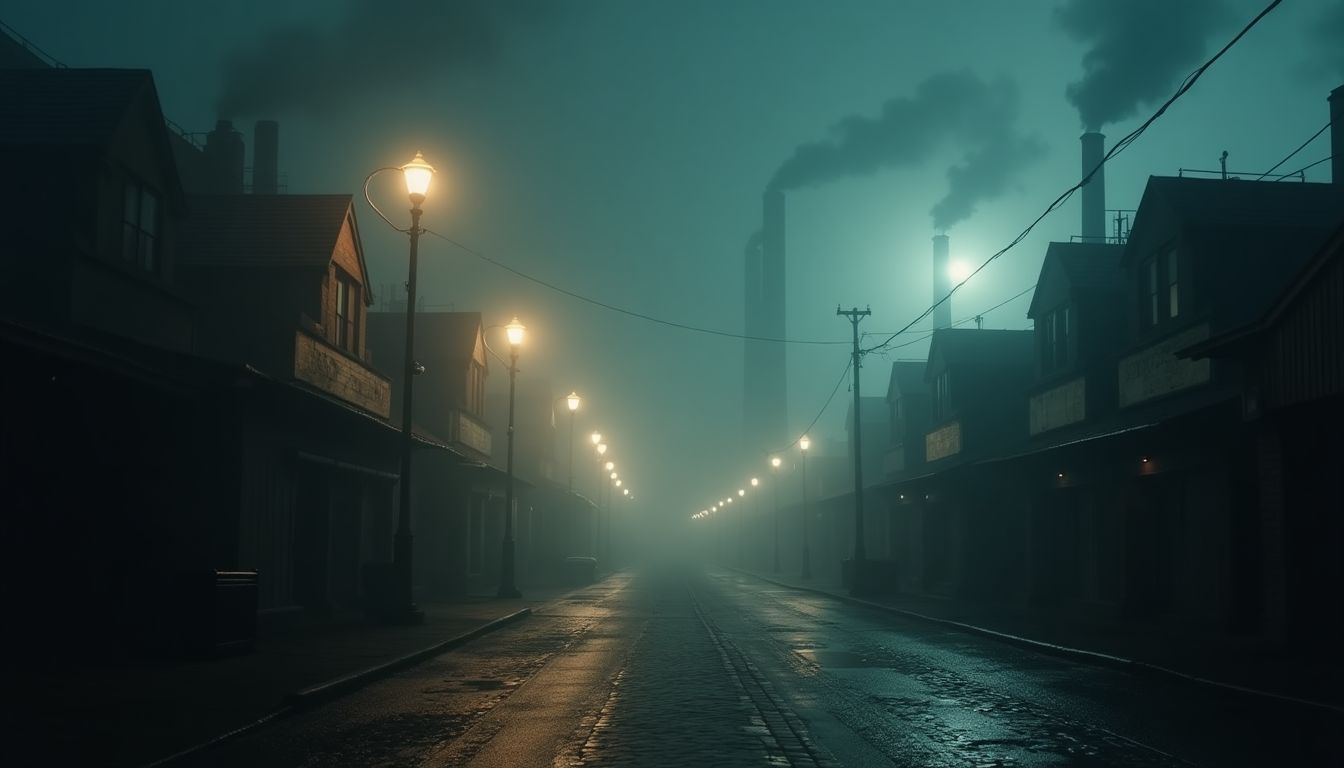The grey mist wrapped around the base of the mountain like a shroud, hiding the trembling foothills beneath it. Far below, smoke from countless chimneys rose into the slate sky, mingling with the sharp smell of roasted barley and damp stone. It was the 19th century in the industrial heart of England—a world throttled by gears, churning steam, and ambition that cut deeper than the coal dust coating the workers’ hands. The town of Ashbourne was alive with industry, but beneath its hum of progress, something darker stirred.
Elizabeth Harker
Elizabeth Harker was impossible to miss, even among the swarms of soot-faced figures in Ashbourne's overcrowded streets. Her storm-grey wool cloak was spun thick enough to ward off the chill, its hem embroidered with crimson thread in a swirling, almost hypnotic pattern. Underneath, she wore a fitted burgundy dress with brass buttons running up the front, cinched tightly at the waist in the modern industrial cut of the day. Her black leather boots bore the scuffs of a woman who walked with purpose.
She was tall, her posture commanding, with a chestnut-brown braid pinned tightly into a crown behind her head. There was a streak of white running through the braid’s center—a badge of the lightning accident in her youth that had nearly killed her. Her sharp, pale eyes often earned her whispers of suspicion, but to those who dared meet her gaze, there was kindness hidden beneath her formidable exterior.
Elizabeth was a virologist—a dangerous and misunderstood occupation. In an era when illness was still commonly blamed on miasmas or divine punishment, her work often invited ridicule or outright hostility. She had come to Ashbourne after hearing rumors of a strange affliction spreading among the factory workers: symptoms that defied explanation and claimed lives with terrifying precision. This was no ordinary fever—Elizabeth had only seen its like once before, in the laboratories of her mentor, Dr. Clement Mortimer. And it wasn't natural.
The Disappearance
Elizabeth’s rented lodgings were above a printshop, where the faint smell of ink mixed with coal dust from the street below. She sat at the small desk by the window, poring over the notes that had led her here. What tied together the dots in her mind was deeply troubling—a missing shipment of vials from London’s Elias Virology Institute two months ago, only to be followed by an outbreak in Manchester. Then Birmingham. Now Ashbourne.
She had seen firsthand what these vials contained. The Whispering Plague, Mortimer had called it, after the way its victims often complained of faint, surreal murmurs haunting them before paralysis set in. It was the product of Victorian scientific ambition at its most unhinged: a painstakingly engineered virus capable of targeting specific populations. Mortimer had condemned its creation, but apparently, someone hadn’t shared his scruples. Someone had stolen the vials.
The knock at the door was firm. Elizabeth looked up sharply. Opposite, her leather-bound case of instruments glinted dully on the shelf. She moved toward it, letting her fingers brush against the handle as she called, "Enter."
A gruff figure stepped in. Steam and soot clung to his faded frock coat, and a flat cap shadowed his features. It was Foreman Sykes, one of the higher-ups at the Blackthorn textile factory. His narrow eyes darted toward her case. "Miss Harker," he rasped. "Another one’s fallen sick. You’re needed at once."
The Factory
The Blackthorn factory was a metal beast, all howling pistons and clanging looms, its workers pale ghosts of themselves beneath the relentless din. Sykes led Elizabeth through the labyrinthine floor, workers stepping aside and glancing at her warily. They knew her reputation—a woman who thought she could speak with the voice of science, even louder than the machines around her.
They reached a shadowy corner where a group of men huddled around a stretcher. The young factory boy upon it could not have been more than fifteen. His auburn hair was damp with sweat, his lips cracked and trembling. His hands clutched his abdomen in a feeble grip, but his eyes were filled with sheer terror, darting toward things no one else could see.
"When did it begin?" Elizabeth asked briskly, setting down her case and pulling out her instruments: a glass barometer, a vial of saline, a needle and thread for stitching. She didn’t look up as Sykes stammered his answer.
"Two hours ago. Complained of… of whispers, like the others. Then he collapsed."
"Where is your water supply drawn from?” she asked sharply.
"The well at the edge of the forest," he replied.
"And the food? Any recent shipments you don't recognize?"
Sykes hesitated. "Just the usual suppliers..." His words faltered under her piercing gaze. "But last week," he admitted, "there was a stranger in the market square. Shady sort. Peddling something—powders or tinctures."
Revelation
Elizabeth didn’t reply. Instead, she examined the boy’s veins—thin shadowed trails stretched black against pallid skin. Her breath hissed through her teeth. It was as she feared. The pathogen had been deliberately released in Ashbourne, disguised as a curative tonic for the exhausted factory workers. She stood abruptly, a blinding clarity in her mind now.
She turned toward Sykes, her tone unyielding. "Find this peddler. Do whatever it takes. He’s the vector."
"And the boy?" Sykes gestured uncomfortably toward the stretcher.
"Get him water—boiled. Plenty of it. Keep him warm," Elizabeth said, gathering the boy’s trembling hand in her gloved one for a moment of silent resolve. She met the boy’s frightened gaze, her expression softening. "You’ll fight this," she whispered.
She would not let Ashbourne suffer the fate destined for it. Not while she still had time to unmask the shadowy perpetrator behind this horror.
The Hunter and the Hunted
Elizabeth stepped back into the misty streets of Ashbourne, her cloak swirling crimson in the murky half-light. The brass clasp at her neck shone faintly like a soldier’s medal. Her sense of time faded as she pursued her only lead, weaving through crowded markets, abandoned alleys, and the grim corners most dared not tread.
This wasn’t just about Ashbourne—or even England. If the Whispering Plague could be used as a weapon here, it could be turned on anyone, anywhere. She was no longer just a virologist. Now she was a hunter.
And somewhere, in the fog-choked streets ahead, her prey waited.
The murmurs of the Plague had only begun.
The Source...check out the article that inspired this amazing short story: Hundreds of vials of DEADLY viruses have gone missing from a laboratory - and scientists warn they could be 'weaponised' bioweapons
Disclaimer: This article may contain affiliate links. If you click on these links and make a purchase, we may receive a commission at no additional cost to you. Our recommendations and reviews are always independent and objective, aiming to provide you with the best information and resources.
Get Exclusive Stories, Photos, Art & Offers - Subscribe Today!

























Post Comment
You must be logged in to post a comment.